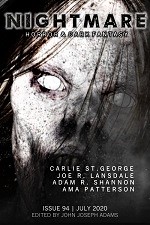“Spider Season, Fire Season” by Carlie St. George
“The Folding Man” by Joe R. Lansdale (reprint, not reviewed)
“We Came Home from Hunting Mushrooms” by Adam R. Shannon
“Hussy Strut” by Ama Patterson (reprint, not reviewed)
Reviewed by Tara Grímravn
Nightmare Magazine #94 is back this month with two original stories nestled amid a couple of excellent reprints and articles, including a quick author spotlight. While the reprints are beyond the scope of this review, both original stories center around loss and tragedy in one form or another.
“Spider Season, Fire Season” by Carlie St. George
A few months ago, a very pregnant December ran away from her abusive husband, Jacob. Despite promising herself that she’d never live in a haunted house again like the one in which she grew up, circumstances forced her to take up residence in a house inhabited by a swarm of spiders and the ghost of its former owner, Olivia de la Cuesta, who was murdered five years prior. It’s during the long nights of winter that ghosts start to wake up from dreams of their dying moments—a time when they’re also at their most dangerous. With a new infant and the ever-looming threat from Jacob, she needs to find a way to wake and befriend Olivia if she has any hope of finding peace.
I’m going to go out on a limb here and say that this is one of the best short horror stories I have read this year. It strikes so many emotional chords and solidly connects the reader to each character; so much so that I remained engaged and completely invested in the tale through to the end. For me, it was quite enjoyable to read this tale that is both harrowing and heartwarming.
St. George has divided this roughly 3,700-word work into numbered sections. Most of these present a new point-of-view character, each one integral to the overall plot. We’re introduced first to December (Dorothea), then Olivia, Clara, and Jacob, in that order. There is only one section in which the reader isn’t immediately clued in that the point-of-view has shifted (Olivia’s section). Normally, this would be a writerly sin in my book, but I think I understand why the author chose to do this. It immediately disorients the reader, almost like waking from a nightmare and not recognizing one’s own bedroom. But Olivia is also very disoriented and confused (and rightly so) in this scene. I suspect that St. George intended for the reader to share her confusion and panic, thus further grounding them in the narrative. The ending does a fantastic job of bringing the story full circle to a hopeful conclusion.
All the above aside, for those who are not fans of non-linear storytelling, this story might miss the mark. It most certainly makes a few chronological leaps back and forth, and that might throw some readers off. Audiences should also keep in mind that this is undeniably a horror story. It contains some brutal imagery, especially where Olivia is concerned. That said, I highly recommend this one, even if one is predisposed towards a more linear style.
“We Came Home from Hunting Mushrooms” by Adam R. Shannon
Five friends set out to find a species of mushrooms said to hide one from God’s sight. You see, the President has told everyone that this is the sixth time that God is going to punish sinners by making them vanish and relegating them to the ranks of the Forgotten. The problem is, no one remembers anyone ever becoming Forgotten, but whether that’s because they simply can’t remember or it’s a type of political manipulation is uncertain. When they arrive at the woods, they begin searching for the special fungus, desperate to keep each other in sight and not forget anyone.
There is a lot to unpack in Shannon’s story; it’s just difficult to say exactly what it is we’re expected to take away. It appears to provide commentary on religion, politics, and relationships, but the way it’s presented comes across as a little uncertain and underdeveloped. Admittedly, the tale is unsettling—it’s hard to imagine living in a world where one lives under the constant threat of losing loved ones to a vengeful god and must constantly question their own memory, thus being left to wonder exactly what it is that they don’t remember—but it takes so long to get there. What made the feeling finally settle in for me was when the group gets back to the car and they nearly left the dog behind.
Dialogue is sparse in this narrative, but what does exist is broken up by huge swathes of tedious, long-winded exposition that are hard to get through. I realize that the details provided help set the stage and establish conflict, but it’s done in such a way that it feels like being frequently forced to march through a rambling “info dump” more than anything else.
There’s also not much in the way of characterization here. The only character I got a feel for at all was the unnamed narrator, who is not remotely likable—not at the beginning and certainly not at the end. The rest of the characters are very cardboard and two-dimensional. It’s as if the narrator had already forgotten them before the story started and was riding around with a bunch of strangers. Although the story insists on the bonds of friendship between them, they seem non-existent, making it hard to believe this group of people would go to such lengths to avoid forgetting each other. Given the story’s premise, this may be intentional but, for me, it doesn’t make for interesting reading. Unfortunately, this story just didn’t hit the mark for me.
 Nightmare
Nightmare